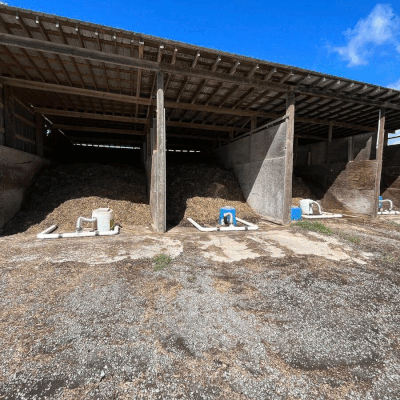Compost as the Cornerstone of Regenerative Agriculture

By Frank Franciosi
In the 1980's I started out my business career as a territory sales manager at a chemical lawncare company. It has been over 30 years since then, and when I look back on my career I am so thrilled to have moved away from an industry that degraded the environment to now being a representative of a thriving industry that is actively seeking to repair our soils and limit our dependence on landfills.
My zeal for compost is stronger today than it was in 1993 when I started North Carolina's first source-separated organics composting facility. Each day that I get a chance to interact with any of our over 1,800 members, I am re-invigorated with the mission of the USCC to advance compost manufacturing, compost utilization, and organics recycling to benefit our members, society, and the environment.
This week I was lucky enough to visit a fellow North Carolina composter, vermicomposter, compost tea enthusiast, and soil scientist Dr. Laura Kavanaugh at Union Grove Farm. Laura is the Director of Vine and Soil Health and Director of the Regenerative Agriculture Center. Among many other things, Laura makes compost tea for use on Union Grove's Vineyard. Laura will be teaching a workshop on compost tea at COMPOST2024 in Daytona Fl.
Walking around the farm, I was struck with the circularity of their ambitious operations. They have sheep for rotational grazing, windrow composting, vermicomposting, a distillery under construction (of particular interest to me), and an expanding vineyard growing table grapes pesticide free with compost teas and other regenerative methodologies. Laura and her colleagues, Martin Crompton and Greg Bohlen, provide an example of a farm that is trying to pioneer regenerative agriculture in North Carolina. Union Grove Farm's utilization of composting is a beacon of hope and a roadmap for farmers eager to transition to a more sustainable path.
And if we are to be a part of breaking the United States away from its addiction to chemical fertilizers and pesticides, we will need to make biologically active rich compost available and accessible to farmers nationwide. The Union Grove Farm operation needs to continue at scale, and the biggest two hurdles I see are awareness and funding. I am heartened by the work USCC staff and committees are doing to expand our markets through market development, compost procurement reimbursement through programs like 336, and a national compost awareness campaign queued up for the spring.
To learn more about Union Grove Farm and their inspiring approach to regenerative agriculture, visit their website at https://uniongrovefarm.com/.